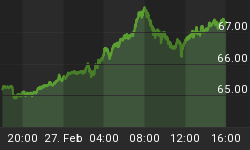It seems that few people look at M2 money supply these days, so the fact that the odometer on the key money supply gauge rolled to $10 trillion today seems likely to remain unlamented. The trip from $9 trillion to $10 trillion took a mere 66 weeks, half the time that the trip from $8 trillion to $9 trillion took. The robust growth of money supply, even though money velocity continued to decline over most of the period (we will find out whether it declined in Q2 when tomorrow's GDP figures are released), is clearly implicated in the rise of core inflation over the same period (see Chart, source Bloomberg).

The pace of M2 growth recently has softened to only 8.4% over the last year, and is likely to fall further over the next few weeks as the end-of-July spike from last year falls out of the data. Yet even a decline to 7% implies a faster rate of core inflation, unless velocity continues to decline as well. As commercial bank lending growth is now growing comfortably faster than 5% per year (most recently at 6% over the prior 52 weeks), this seems a bad bet, and I continue to expect core inflation in the U.S. and in other developed countries to move higher rather than lower.
The Fed, as it readies QE3, will not be acting alone. This is made evident by ECB President Mario Draghi's statement this morning that "Within our mandate, the ECB is ready to do whatever it takes to preserve the Euro. And believe me, it will be enough."
And yet, as of yesterday, Greek bonds are no longer good collateral at the ECB. The reports from the Troika out of Greece seem to make plain that no more rescue money will be headed to that country. I will note that a "planned" exit of Greece from the Euro, or at least a planned default, would surely include the refusal of Greek bonds as ECB collateral, because otherwise upon the event the ECB would be suddenly vastly undercollateralized or uncollateralized on its loans to Greek banks - not a good idea. I won't go so far as to predict that Greece is about to be squeezed out of the Euro, but it is consistent with the following:
- Increased discussion of QE3 and the mooting of the question by presumed Fed mouthpiece Jon Hilsenrath of the Wall Street Journal.
- The ECB's decision at its last meeting to cut the deposit rate to zero, and recent discussion of the possibility of a negative rate, even as Euro M2 last month rose to its highest year-on-year growth rate in several years (albeit still a feeble 3.4%), shows a renewed determination to get the pendulum of monetary policy swinging in a positive direction.
- The rejection of Greek bonds as good collateral at the ECB, as mentioned above.
- The story in Der Spiegel that declared the IMF wants to cut off Greek aid, which is after all a reasonable thing to do the moment it is clear that it has no chance of staving off Greece's collapse and exit from the Euro.
- Increasingly us-against-them comments by Greek Prime Minister Samaras, who sill be responsible for rallying his country's spirits and economy after the exit.
The timing of a Greek exit from the Euro is perhaps not ideal - that would have been last year, before so much money was wasted, when the European economy wasn't yet in recession, and when the U.S. economy at least had some positive momentum - but it is not likely to get much better. From the Fed's perspective, the timing of additional easing will get more difficult, especially if the domestic economy awkwardly begins to zig-zag back up. It is much more politically astute to do QE3 after a horrible Durable Goods number (like today's, which pushed the 6-month average change in core Durables negative for the first time since 2009) than it would be to do it when it was obviously done to help Europe.
Moreover, headline inflation has recently dropped below core, but it will not stay below core for long as gasoline and food prices have recently begun to rise. So there is a limited window during which the doves can point to domestic economic weakness (this window may not be so small, but you never know) and the hawks can claim they see no inflation evil even with core inflation sitting at the Fed's target. The Fed's contribution would very likely be to drop the interest on excess reserves (IOER) charge to zero, which would also harmonize deposit rates with the ECB. This would be a significant policy move, spurring even more lending, while not looking as significant as a QE3 that involved further bond-buying.
In short, I think you should say your goodbyes to IOER and to Greece, because I expect neither of them is going to be around for very long.
There was another interesting development last week - a very significant story whose implications seem to have been largely overlooked. I will discuss this story, which has near-term bullish implications for both stocks and bonds, tomorrow.















